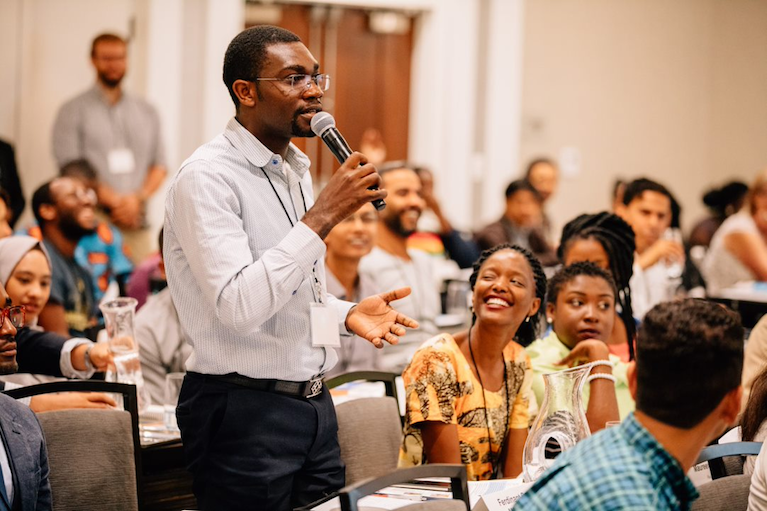How dynamic leadership development increases impact worldwide

As the world’s challenges grow more complex, the need for dynamic leadership also increases. Dynamic leaders with the skills, expertise, and networks necessary to lead transformative change are essential to addressing societal challenges in communities around the world.
At IREX, we recognize the need for values-driven, visionary leaders. In 2019, we launched a leadership approach to help facilitate leaders’ personal and professional development. The approach identifies leaders, develops their capabilities, provides opportunities for growth, and helps them build networks to amplify their impact.
This approach helps increase leaders’ ability to overcome complex challenges and builds cross-sector partnerships to create more just, prosperous, and inclusive societies.
The Community Solutions Program (CSP), a program sponsored by the U.S. Department of State and supported in its implementation by IREX, applies the approach to expand leaders’ skills and knowledge to positively impact communities around the world. Here are the steps organizations can take to develop dynamic global leaders.

1. Identify potential
It is important to recruit diverse leaders—from community organizers to executive directors—who demonstrate potential for sustainable impact. CSP regularly tracks live recruitment data and compares it to demographic and subregional targets. The team then pivots recruitment efforts to target underrepresented demographics and regions. With these efforts, CSP recruited the most diverse pool of applicants in its history. From 2018 to 2019, applications increased 35%. Finalists were from 98.8% of the 87 eligible countries.
2. Develop capabilities
To prepare leaders to navigate evolving challenges, IREX selects leaders with a wealth of knowledge and technical skills in their given disciplines. These leaders develop their capabilities through leadership programs’ opportunities for continued growth. Throughout the process, IREX reinforces key values such as honesty, integrity, adaptability, and inclusion.
In addition, leaders build skills to interpret community data accurately and translate the findings into well-informed decisions that respond to the community’s needs. Leadership programs connect these leaders with other like-minded partners, mentors, and colleagues internationally so they can build relationships to advance social good.
CSP develops capabilities through its U.S. practicum experience and the Community Leadership Institute (CLI). The CLI is a data-informed, field-tested, comprehensive leadership curriculum consisting of in-person and virtual modules, workshops, and networking opportunities.
“It was through the leadership development process with CSP that I first learned I was a leader. Because of this, I returned to Haiti comfortable in my role as a leader in order to serve my community.”
2013 CSP alum from Haiti
Through the CLI and her U.S. practicum with the Sunlight Foundation, 2016 CSP alumna Joy Namunoga learned data interpretation, policy analysis, and advocacy skills that she applied to her work on advocating against accountability violations in Uganda.
As a project advocacy officer with an international NGO, Namunoga works with 18 local governments to diversify revenue streams for improved public service and collaborates with national anticorruption organizations to increase accountability in public service. By increasing citizen participation in the policy process, Joy is also helping accelerate government responsiveness.
3. Provide opportunities
The next step in IREX’s leadership approach is to provide leaders the opportunity to learn, practice, and reflect, and the opportunity to access relevant tools and resources to confront their communities’ most pressing issues. Curricula, experience, and mentorship provide opportunities for dynamic leaders to expand their knowledge, apply what they learn, and reflect on their experience to improve their leadership.
Community Solutions’s CLI provides leadership development through a blended curriculum of online coursework, in-person training, guided personal reflection, peer-to-peer feedback, and hands-on individualized coaching. The U.S.-based practicum serves as a learning laboratory where leaders can learn about and practice CLI topics by applying them in a U.S. context.
Upon returning home from their U.S. practicum, CSP leaders implement a six-month follow-on Community Action Project (CAP) that addresses an identified community need. During the CAP implementation period, fellows can participate in virtual discussion sessions and expert-led virtual workshops that share skills and ideas to support each stage of project implementation.
With fundraising and networking technical support from CSP, Joy’s Community Action Project strengthened the Ugandan health system’s supply chain and attained financial contributions to scale up the project from six months to 16 months.
"Through CSP, I interacted with leading experts’ in transparency and accountability, with whom I created a lasting network of high-level practitioners... who are an invaluable professional resource.”
Joy Namunoga, 2016 CSP alum
4. Build networks
Throughout a program cycle, it is important to include network-building opportunities that allow for collaboration and innovation. Leaders can leverage these networks and participate in communities of practice that can provide support and learning opportunities. Tools such as social network analyses and network mapping can help organizations gather data, understand and measure the growth and effectiveness of the networks, and improve program implementation.
CSP recently conducted a social network analysis to measure the alumni network’s effectiveness and sustainability. The results showed that the network was more than twice as connected in 2018 as compared to 2016.
CSP also provides opportunities for leaders to connect by hosting annual alumni conferences, funding collaborative project travel grants, supporting a virtual CSP Alumni Board, and managing a private Facebook group for leaders.
With opportunity, support, and experience, global leaders can more effectively promote positive change and become dynamic, values-driven, visionary leaders. Through the application of this leadership approach, dynamic leaders gain the opportunity to propel themselves and their communities forward.
The Community Solutions Program is sponsored by the U.S. Department of State with funding provided by the U.S. Government and supported in its implementation by IREX.